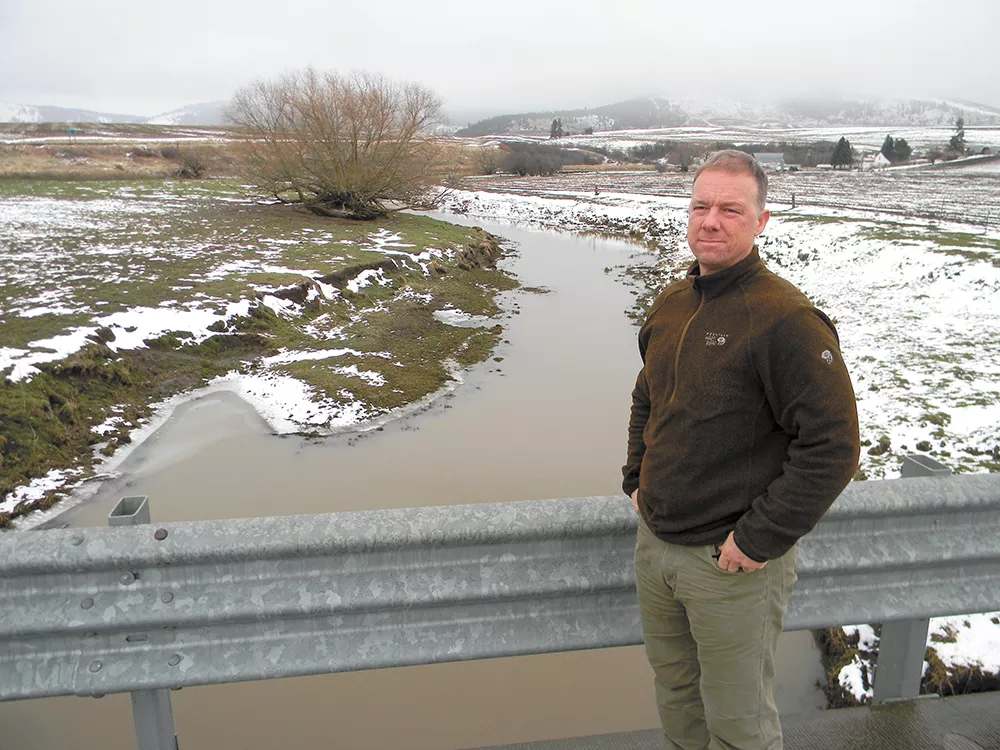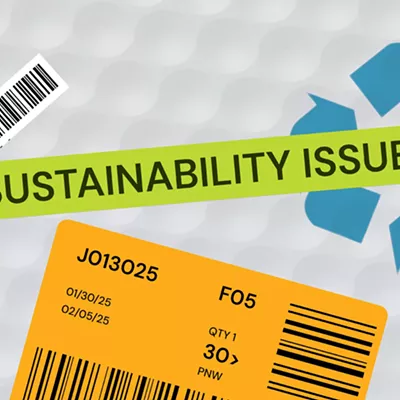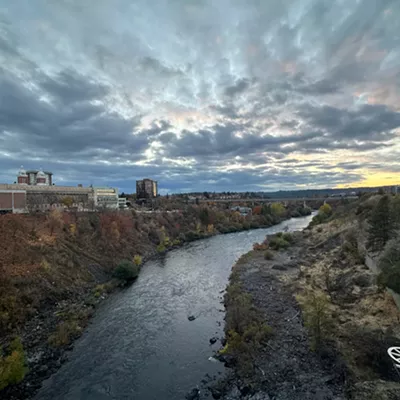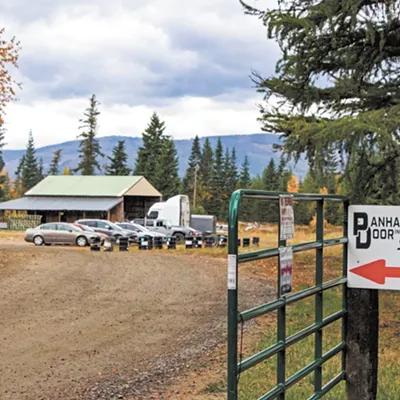Jerry White dunks a Mason jar into the chocolate-milk-colored waters of Hangman Creek. This dingy water, he says, is the poster child for one of the biggest environmental problems facing Washington. It's also a symbol, he says, of a state agency too timid to enforce its regulatory mandate.
As the water swirls and settles in the jar, White, who advocates for clean water as the Spokane Riverkeeper, says he suspects the creek has been brown so long that people think it's normal.
"That's not normal," says White. "This is nuked. This is a broken creek."
Local tribes once speared salmon on its banks in the Palouse in the 1800s, but agricultural runoff has made it the most polluted waterway in the state, according to the Washington State Department of Ecology. It shouldn't be this way, says White.
Two years ago, the state Supreme Court decisively ruled that Ecology has the authority to "control and prevent" sources of pollution from agriculture, meaning it can order ranchers to plant streamside vegetation to prevent soil from eroding and fertilizers from washing into waterways. The department also can order ranchers to build fences to keep cows from trampling vegetation and making cow pies in waterways, which can pollute water that people drink, play in or rely on for industry.
This newly recognized authority has brushed up against private property rights that have been held sacred in the rural West ever since the region's days as a frontier. Farmers and ranchers say that the new requirements have the potential to cripple their livelihoods, are based on faulty assumptions and take a cookie-cutter approach to ecological conditions that differ greatly by farm and region.
"We in agriculture feel that the law is based on not anything but people's misconceptions," says Toni Meacham, a Connell rancher and attorney who has helped farmers and ranchers successfully challenge the Department of Ecology regulations.
White says that Meacham's efforts have created an "environment of obstruction" and prevented Ecology from addressing a substantial source of pollution in the state. Clean-water advocates say that the problem is also political, and the department has backed down in the face of industry backlash.
"This is a dynamic that is really troublesome," says White. "Ecology has a responsibility to ensure the public has clean water."

John Pearson, a 53-year-old rancher, climbs out of his shiny Chevy Silverado on a bridge that spans Cow Creek along a stretch of highway outside of Washtucna, about 30 miles south of Ritzville. As semi trucks roar past, he points to a mile-and-a-half stretch of land where he sometimes grazes his herd. About a decade ago, Pearson received a letter from Ecology telling him that his cows were polluting the creek and he needed to build a fence.
He built the fence, costing him $45,000 and $4,500 annually to maintain. Ecology also wanted him to pipe in water to his cows from a well. Doing so, he says, would have cost another $36,000. He hasn't done it because, he says, water hasn't run in the creek for two years and it'll be another two before water runs again. When water is running, he uses a narrow opening in the fence to allow the cattle to access the creek, which he says prevents them from causing erosion or defecating in the water. Ecology referred him to programs to help offset the cost, but Pearson has avoided them out of concerns that the money would come with conditions limiting how he could use his land.
"If you can convince us that we are destroying or damaging the water quality, then I think the farmer will be the first to change his practices," says Pearson, who has faced no fines for refusing to install the pipes and well. "But we're not seeing any information that shows us that we are."
White says that ranchers and farmers shouldn't get to pick and choose what laws they want to follow. He says that Meacham, the Connell attorney and rancher whose family has raised cattle on the Palouse since the 1800s, has created an environment that's made it harder for Ecology to regulate agricultural pollution.
In 2013, Meacham lost a landmark state Supreme Court case that established Ecology's authority to keep cows, runoff and agricultural pollution out of waterways. But her advocacy work following the case has continued to keep state regulators largely at bay.
Since the court's ruling, Meacham got organized, helping set up educational events for ranchers and farmers. She's also represented farmers and ranchers who've received letters from Ecology.
Often, she says, the letters describe a "potential" to pollute, a standard that she says wouldn't be tolerated by city dwellers. The department, she says, backs down quickly after she demands proof.
Over the past two years, the department has sent out approximately 250 letters to agricultural producers (mostly livestock owners) warning them of pollution problems on their land. But according to department spokeswoman Brook Beeler, only three letters have resulted in financial penalties, the most notable of which was a $12,000 fine levied against a Whatcom County couple whose livestock were polluting shellfish beds.
Beeler says that the Ecology Director Maia Bellon, who was appointed to the position shortly after the decision, opted to take a collaborative approach with agriculture, convening an advisory panel to listen to concerns from both sides with the goal of finding solutions. According to Beeler, about half of the farmers and ranchers Ecology contacts respond and accept technical assistance to address issues on their property.
"It's really all about politics," says Andrea Rodgers, a staff attorney for the Western Environmental Law Center. She says that ever since the court decision, lawmakers have introduced legislation to cut the department's funding or reduce its authority, making its officials reluctant to take a harder line.
"The agricultural community is very galvanized around the notion that regulatory approaches should not be implemented to address agricultural pollution," Rodgers says.
In the 1960s and '70s, Congress passed legislation regulating industrial pollution and forestry practices, says White. Agriculture, he says, had escaped similar regulations because it occurs primarily on private property and because the industry has maintained a bucolic public perception. But according to the U.S. Environmental Protection Agency, it's become the largest source of stream pollution in the country.
Ecology's regulations are based on the idea that bacteria from animal waste, as well as nitrogen and phosphorus used to fertilize crops, runs into waterways that can destroy fish habitat and also make water unsafe for drinking or recreation. In Western Washington, commercial shellfish beds have closed because of contamination from livestock waste. Drinking-water wells in the lower Yakima Valley likely have been polluted by nitrates, and property owners near Deep Lake in Stevens County worry that pollution from ranches upstream is making the lake unhealthy to swim in.
"We live in a country where water is public, and from our perspective you're cheating the public of an entitlement that is deeply American," says White.
In 2013, the Government Accountability Office, the investigative arm of Congress, released a report finding that regulations established by the landmark federal Clean Water Act of 1972 weren't meeting their goal of guaranteeing "fishable, swimmable and drinkable water" because they largely exempt agriculture. Implementing the law is typically left up to state agencies, like the Washington State Department of Ecology, and they're allowed to include more expansive regulations intended to address specific issues.
Scott Yager, environmental counsel for the National Cattlemen's Beef Association, says that Washington is unusual in including agriculture in its Clean Water Act regulations, and that other states are considering similar steps. Across the border in Idaho, the EPA directly administers the Clean Water Act, meaning that it has the most basic level of regulation under the law.
Concerns about Ecology's authority come at a time when ranching is declining. According to a Washington State University study, the number of cows in the U.S. peaked in 1982 at 39 million and declined by more than a quarter by 2014. In Washington, that decline has been twice as rapid.
Ranchers say that these regulations don't account for the complexity of agriculture and aren't helping the environment.
Hal Meenach, president of the Spokane County Farm Bureau, says that the poor condition of Hangman Creek derives from naturally occurring soil erosion. Many orders from Ecology, he says, would make make too many farms and ranches economically unviable and would produce few environmental benefits. For instance, he says, requiring streamside vegetation can cut into valuable land and also can backfire, attracting wildlife that will deposit more fecal bacteria into the waterways than cattle do.
Cattle grazing cuts down on plant species, says Pearson. The bottom line, he says, is that cattle may pollute, but the environment is better off with them.
"Ranchers and farmers aren't doing what they're doing because they don't like the environment," says Pearson. "They are as much as in love with the environment as any environmentalist."
Last year, Nevada rancher Cliven Bundy became a right-wing darling after an armed standoff with federal agents over grazing rights. The Western Environmental Law Center's Rodgers says that currently, Washington's agricultural community's resistance to regulations hasn't reached Bundy-like levels. But she says that could change, with a recent federal court decision that's expected to bring more scrutiny to how dairy farms manage manure.
"There is a lot of fear in the industry, and frankly, there should be fear," she says. "Until the industry gets out of the dark ages and acts, there will be a threat in the form of regulation and litigation." ♦






















